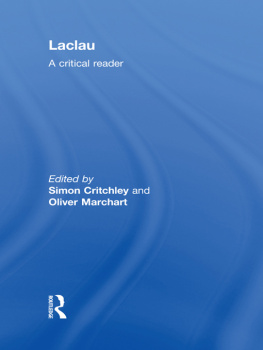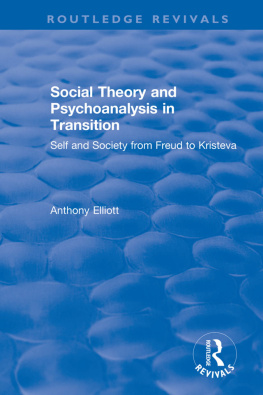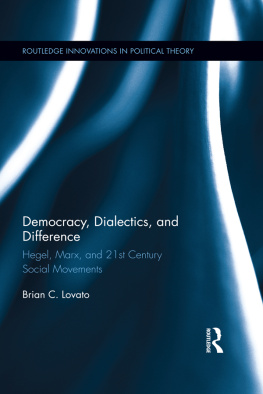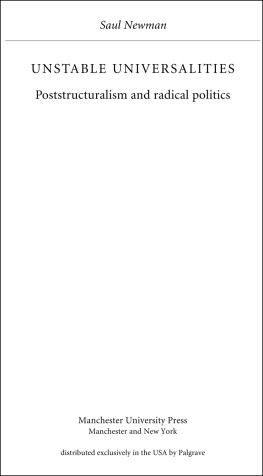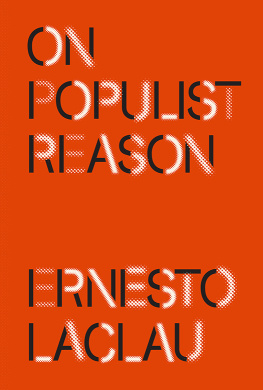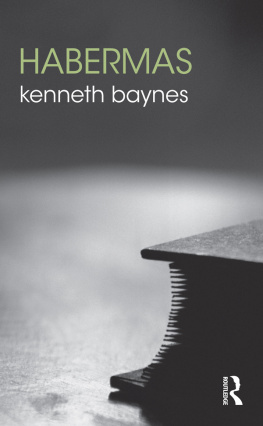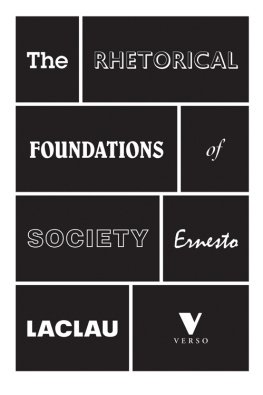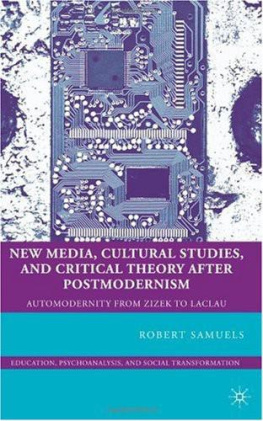LIST OF ABBREVIATIONS
| PIM | Politics and Ideology in Marxist Theory , London: New Left Books, 1977. |
| HSS | Hegemony and Socialist Strategy , London: Verso, 1985, with Chantal Mouffe. |
| NR | New Reflections on the Revolution of Our Time , London: Verso, 1990. |
| E | Emancipation(s) , London: Verso, 1996. |
ACKNOWLEDGEMENTS
An earlier version of Fred Dallmayrs chapter was published as Hegemony and Democracy: On Laclau and Mouffe, in Strategies 30 (Fall 1988), pp. 2949. Linda Zerillis chapter, This universalism which is not one, was first published in Diacritics 28.2 (1998), pp. 320. The exchange between Judith Butler and Ernesto Laclau was previously published in Diacritics 27.1 (1997), pp. 315. We are grateful to the authors and publishers for their permission to reprint the essays.
Appendix I
THE USES OF EQUALITY
Judith Butler and Ernesto Laclau
Whats the political value, today, of the use of the signifier equality? Considering the poststructuralist elaboration of difference how does equality work today in gender and/or race politics? Difference has been, for more than a decade, the key word for a certain number of programs related to radical democracy. Certainly, difference has given space to the constitution of new types of social solidarity. Recently, however, some reservations on the extension of the term have been published. Chantal Mouffe in her introduction to Dimensions of Radical Democracy has stated that all differences cannot be accepted in order for pluralism to be made compatible with the struggle against inequality. Mouffe doesnt clarify, in this particular text, the criteria with which to discriminate between acceptable and nonacceptable (or, maybe, pertinent and nonpertinent) differences, nor does she give a nonequivocal definition of equality. Both are tasks that seem crucial for the project of a radical democracy. On his part, Alain Badiou has written that aujourdhui, le concept de libert na pas de valeur immdiate de saisie, parce quil est captif du liberalisme, de la doctrine des liberts parlamentaires et commerciales, such that le vieux mot de lgalit est aujourdhui le meilleur for une politique dmancipation post-marxiste-lniniste. Would you agree with Badious affirmation? I understand, on my part, that equality has received in radical democratic theory, and in recent gay/lesbian and race theory, a treatment much less detailed than freedom or even fraternity (in the form of the problem of the constitution of counterhegemonic types of community). How do you interpret this fact? What sense can we make of equality in the context of progressive politics today?
[Questions posed by Reinaldo Laddaga]
Dear Ernesto,
Sorry to begin this a day late, but too many interruptions happened yesterday. Ernesto, Im very pleased to be in touch, and hope all is well there (I tried to call you when I was last in England but got a recording from a business that was trying to sell telephones struck me as a telephonic mise en abyme ).
We are asked to begin a conversation on equality, and on the problem of acceptable and unacceptable differences. I hardly know where to begin, and think that you would probably join me in the sense of unease that follows from being asked to decide what kinds of differences ought to be included in an ideal polity, and what kinds of differences undermine the very possibility of polity, perhaps even the very ideality without which no democratic notion of polity can proceed. I am a bit perplexed as well by the question of whether or not the notion of inclusion and exclusion, which I know has occupied your work for some time now, is strictly correlated to the notion of equality. So perhaps I will start by offering a set of distinctions between inclusiveness and equality. It seems to me that inclusiveness is an ideal, an ideal that is impossible to realize, but whose unrealizability nevertheless governs the way in which a radical democratic project proceeds.
I gather that one of the reasons, or the key reason, why inclusiveness is bound to fail is precisely because the various differences that are to be included within the polity are not given in advance. They are, crucially, in the process of being formulated and elaborated, and there is no way to circumscribe in advance the form that an ideal of inclusiveness would take. This openness or incompleteness that constitutes the ideal of inclusion is precisely an effect of the unrealized status of what is or will be the content of what is to be included. In this sense, then, inclusion as an ideal must be constituted by its own impossibility; indeed, it must be committed to its own impossibility in order to proceed along the path of realization.
Equality is, of course, a strange concept when thought of in relation to this model (a model that I take to be derived from your thinking on this issue, as well as Chantal Mouffes). Equality would not be the equalization of given differences. That formulation suggests that differences are to be understood as tantamount to specificities or particularities. And the point of a futural re-elaboration of the notion of equality would be to hold out the possibility that we do not yet know who or what might make a claim to equality, where and when the doctrine of equality might apply, and that the field of its operation is neither given nor closed. The volatility of the Equal Protection Clause in the US Constitution gives evidence of this in an interesting way. Is it the case that those who are addressed by hate speech are deprived of their abilities to participate equally in the public sphere? Some feminists, such as Catharine MacKinnon, argue that pornography ought to be opposed because it produces an epistemic atmosphere in which women are not entitled to exercise their rights of equal treatment and participation. Although I oppose MacKinnons view (and her understanding of the performative operation of representation), I do appreciate the way in which the doctrine of equality becomes a site of contestation within recent US constitutional debates. It suggests that we do not yet know when and where the claim to equality might emerge, and it holds out the possibility for a futural articulation of that doctrine.
So, in one sense, then, it seems that the notion of equality would proceed undemocratically if we claim to know in advance who might make use of its claim, and what kinds of issues fall within its purview. And this relates to the ideal of an impossible inclusiveness: who is included among those who might make the claim to equality? What kinds of issues undermine the very possibility of certain groups making such a claim?
But this then raises a different question, namely, are exclusions always to be overcome, and are there certain kinds of exclusions without which no polity can proceed? How might we enumerate such excluded possibilities? Certainly, some kinds of crimes are and ought to be punishable, excluded from the realm of the acceptable, and certainly there are taboos foreclosures in the Lacanian sense without which no subject can function as a subject. The inclusion of all excluded possibilities would lead to psychosis, to a radically unlivable life, and to the destruction of polity as we understand it. So if we accept, as I think we both do, that there is no polity, no sociality, no field of the political, without certain kinds of exclusions having already been made constitutive exclusions that produce a constitutive outside to any ideal of inclusiveness that does not mean that we accept all sorts of exclusions as legitimate. It would be unwarranted to conclude that just because some exclusions are inevitable all exclusions are justified. But that then gets us into the tricky territory of the problem of justifying exclusions. And here I am compelled to turn the conversation over to you.

